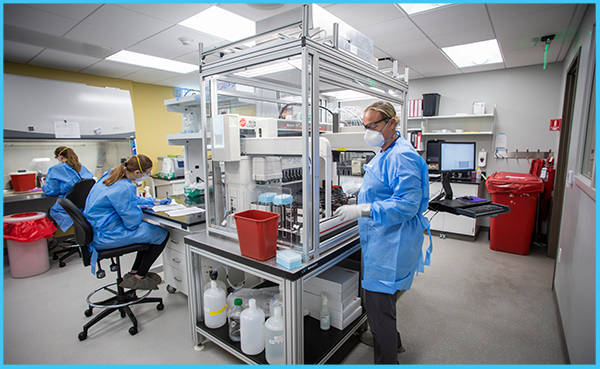
Tularemia. Influenza. Rift Valley Fever. HIV. Ebola. MERS. With decades of deep experience in predicting, preventing and controlling infectious diseases like these, it wasn’t surprising that MRIGlobal remains fully engaged in offsetting the impacts of COVID-19 in myriad ways.
In late 2019, just a few months before the corona virus pandemic dominated the world, MRIGlobal opened its expanded Diagnostics Center of Excellence. The timing equipped MRIGlobal to enlarge its research and development portfolio, taking on new partners like the Defense Advanced Research Projects Agency and the Bill & Melinda Gates Foundation. The institute is also developing chemistry and devices for the Department of Defense’s next generation of clinical diagnostics and developing virtual training modules for COVID-19-related work for Africa’s national public health network.
Early in the outbreak, MRIGlobal focused on the development of Emergency Use Authorization (EUA) assays for SARS-CoV-2 corona virus/COVID-19, followed by further testing to obtain Food and Drug Administration (FDA) clearance for the diagnostic assays. MRIGlobal also evaluated the efficacy and safety of vaccines and therapeutics, including efforts to discover new antiviral candidates and supporting human clinical trials of medical countermeasures now under development.
To address the pandemic, MRIGlobal developed a hamster model to test the efficacy of therapeutics, prophylaxis, and vaccines designed specifically against SARS-CoV-2. Researchers performed an extensive Natural History Study to understand the disease progression and where to best target drugs against the disease.
In another vaccine initiative, MRIGlobal is working on an effective, broad-spectrum vaccine to reduce the devastating impact of African Swine Fever Virus (ASFV). ASFV, a highly contagious and deadly disease, threatens global pork production and there is no vaccine or effective treatment. Currently ASFV is rapidly spreading in China, Asia, and Europe. While most vaccines have been designed to elicit antibody responses, research indicates that a sustained targeted T-cell response is required for protection against ASFV. MRIGlobal’s development strategy focuses on creating DNA-based vaccines that elicit potent T-cell responses to a multiplicity of conserved antigens to achieve broad-spectrum protection.
By: MRIGlobal